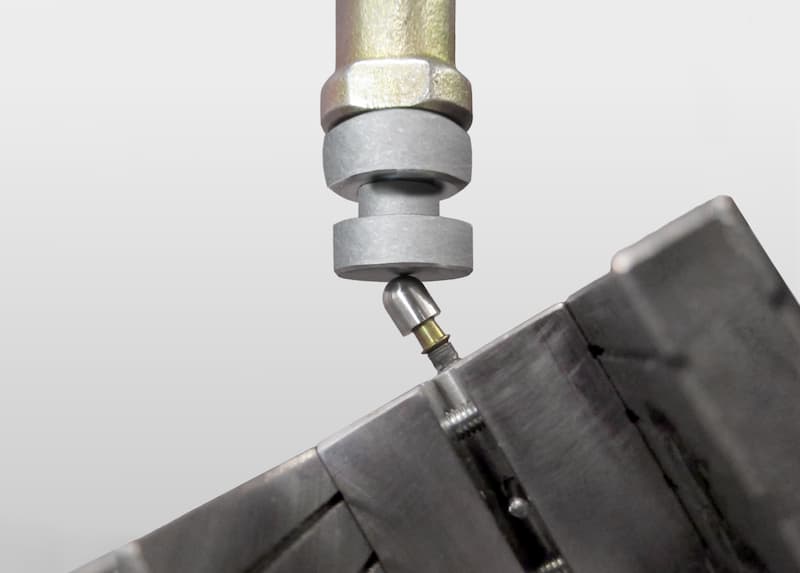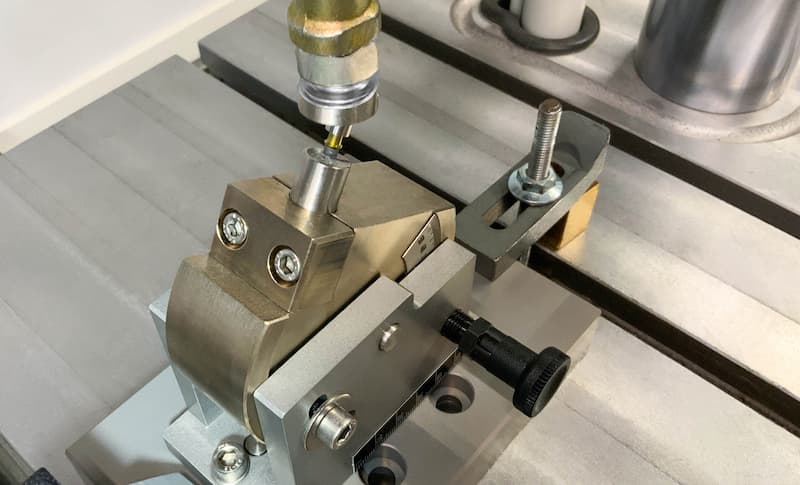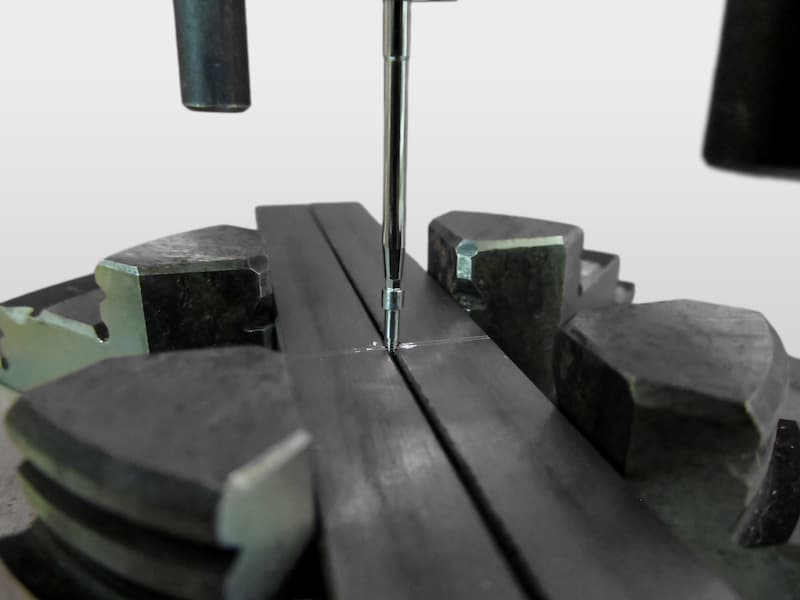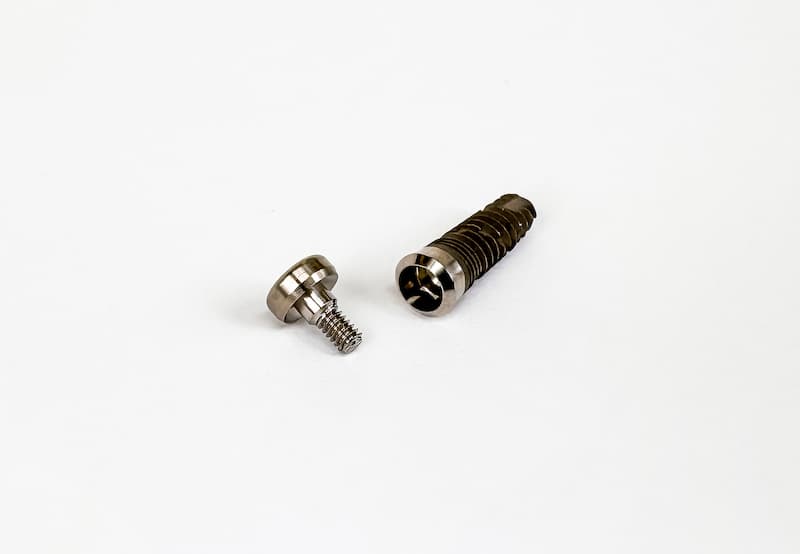DENTAL IMPLANT TESTING LABORATORY ACCREDITED BY ENAC
The Instituto de Biomecánica (IBV) is a reference center for the evaluation of dental implants, offering specialized testing to improve design, optimize performance, and ensure durability prior to market launch.
We are the only center in Spain accredited by ENAC to perform dental implant testing in accordance with ISO 14801. We have the infrastructure and technical expertise to evaluate the static and fatigue mechanical resistance of dental implants, ensuring their safety and performance before commercialization.

We also carry out complementary and customized tests that help manufacturers validate structural improvements, evaluate new material configurations, and optimize implant biomechanics.
Each test is designed to analyze the interaction between the implant and the surrounding tissues, the resistance to mechanical loads and the structural stability of its components. These studies provide key data that can make a difference in the safety and efficacy of the final product.
ENAC-ACCREDITED DENTAL IMPLANT TESTING ACCORDING TO ISO 14801
At IBV, we perform fatigue testing on dental implants according to the international standard ISO 14801.. This test replicates the most demanding biomechanical conditions that an implant undergoes in the patient’s mouth, determining its infinite life load under the flexo-compression stresses defined by the standard.
- The only ENAC-accredited laboratory in Spain for this type of test.
- Expert guidance in selecting the critical size using finite element models.
- Four load levels applied with up to 9 samples tested.
- Resistance assessed up to 5 million cycles on three samples.
- Critical analysis of results.
In addition to the test report, IBV offers personalized guidance and technical recommendations that can be decisive in product development and optimization. We don’t just evaluate — we provide solutions and improvement strategies based on decades of experience in biomechanics.
Request information from our technical team

DENTAL IMPLANT EVALUATION
Our tests allow us to evaluate not only the implant itself, but also the interaction with the surrounding tissues and materials.

Resources and Infrastructure
- Histomorphometry and Image Analysis Laboratory with advanced technology for implant characterization.
- Mechanical Testing Laboratory equipped with fatigue machines and devices for mechanical performance evaluation.

Resources and Infrastructure
- Animal testing and histomorphometric analysis to evaluate biocompatibility and osseointegration.
- Biomaterial studies to determine in vivo performance.
- Animal experimentation and histomorphometric analysis to evaluate biocompatibility and osseointegration.
TESTING OF DENTAL IMPLANT ATTACHMENTS
With our fatigue testing, we can evaluate both the dental implant and focus on the evaluation of the attachments, participating in the selection of the critical size and configuration of the attachments.
COMPONENT TESTING OF DENTAL IMPLANTS
Dental implants are composed of different elements that must guarantee a precise fit, long-term stability and optimal mechanical resistance. At IBV we perform specific tests for each of its parts.
Dental implant
- Materials: Titanium (Grade 3, Grade 4, Ti6Al4V) and other biomedical alloys.
- Geometry: Cylindrical, conical, with optimized coils to improve primary stability.
- Surface evaluation: roughness and surface treatments that favor osseointegration.
Pillar
- Resistance to occlusal loading: Evaluation of abutment stability as a function of design and material.
- Strength testing of angled columns: Analysis of durability under multidirectional loading.
Implant-abutment connection
- Torque test (ISO/TS 13498): Determination of maximum tightening torque and fracture toughness.
- Loosening test: Evaluation of connection stability after repetitive load cycles.
These tests validate the structural design of each component, ensuring optimal integration and reliable performance of the implant over time.


COATING AND SURFACE ADHESION TESTING
Many dental implants incorporate surface treatments that enhance osseointegration or reduce friction and wear.
At IBV, we assess the quality and durability of these coatings through specialized testing.
- Adhesion test of metallic and ceramic coatings (ASTM F1147): Determination of bond strength between coating and implant.
- Wear resistance tests: Simulation of friction and contact with dental and biological materials.
- Evaluation of roughness and surface treatment: Analysis of implant topography to optimize osseointegration.
These tests verify that the surface treatments applied to dental implants maintain their integrity over time and enhance bone fixation.
Universal testing machines for static and fatigue compression and torsion tests
● Uniaxial MTS (+/- 25 kN)
● Biaxial INSTRON 8870 (+/- 25 kN and +/- 100 Nm)
● Uniaxial INSTRON 8872 (+/- 25 kN) + knee simulator
● ElectroPuls E3000 (+/- 1 kN)
DENTAL IMPLANT TEST KITS
To ensure precise and replicable results, we use state-of-the-art technology.
ADVANTAGES OF TESTING DENTAL IMPLANTS IN AN ACCREDITED LABORATORY
At IBV, we not only certify, we add value. Our work methodology is not limited to the execution of tests, but includes a detailed analysis with technical recommendations that can optimize the design of the implant, improve its durability and accelerate its entry into the market.
We produce reports that not only meet regulatory standards, but offer manufacturers a real competitive advantage by being experts in biomechanics. Because at IBV, excellence is not just an objective, it is the standard we work with every day.
- Compliance with international standards (ISO 14801)
- Greater confidence in the safety of the results, by using calibrated and certified testing machines and complying with the procedure indicated by the standard in its entirety as it is accredited in testing by ENAC.
- Streamlined approval for CE marking and regulatory certifications
- The only accredited laboratory in Spain for these tests.
WHY CHOOSE IBV FOR DENTAL IMPLANT TRIALS
The evaluation of a dental implant goes beyond meeting standards. It requires a comprehensive approach that combines mechanical and biomechanical testing with real-world interaction analysis.
At IBV, we don´t just test, we add value. We help companies optimize implant design, improve durability, and accelerate time-to-market.
We help companies optimize implant design, improve durability, and accelerate time-to-market.
Our reports go beyond regulatory compliance — they provide manufacturers with a real competitive advantage, backed by our biomechanical expertise. At IBV, excellence is not just a goal — it’s the standard we work by every day.
At IBV we offer:
- The only laboratory accredited by ENAC for dental implant testing 519/LE1105.
- Traceability of measurements to national and international standards, ensuring the reliability of test results for third parties and public authorities.
- A quality management system based on ISO 17025, under which all testing activities are conducted.
- Mechanical testing laboratory: fatigue, torsion, and material strength testing, among others.
- Specialized team in biomaterials and dental biomechanics.
- Methodology adapted to each manufacturer: Customized tests according to the implant design and materials.
- Strategic analysis: We offer technical recommendations to optimize implant performance prior to market launch.
- Specialized resources and qualified personnel to support companies in conformity assessment and regulatory compliance, including CE marking processes.
Contact us for more information about our dental implant trials.
Our technical team will be at your disposal to analyze your needs and offer you a customized proposal.
Frequently Asked Questions
Why is it necessary to carry out mechanical and biomechanical tests on dental implants before their commercialization?
Through fatigue, torsion, strength, and wear tests, manufacturers can identify critical points in the design or materials.
These data are essential for certification and CE marking, as the European Regulation (EU) 2017/745 (MDR) requires experimental evidence demonstrating the product’s reliability under real-use conditions.
What exactly does the fatigue test measure according to the ISO 14801 standard?
The test determines the implant’s service life (up to five million cycles) and its ability to withstand flexural-compression stress without fracturing or deforming.
Accredited laboratories, such as the Institute of Biomechanics (IBV), apply this standard in a consistent manner, allowing manufacturers to compare results and validate designs according to international criteria.
What types of materials and coatings are analyzed in dental implant testing?
In addition, many include metallic or ceramic coatings to enhance osseointegration or reduce wear.
The most common tests include:
- Coating adhesion test (ASTM F1147): to verify bond strength.
- Wear and friction tests: to evaluate performance against biological materials.
- Roughness and topography analysis: to determine the implant’s ability to integrate into bone.
What role does biomechanics play in the design and validation of dental implants?
Through simulations and testing, aspects such as stress distribution, primary stability, and the risk of micromovements that could compromise osseointegration are analyzed.
Specialized centers such as IBV apply finite element models and comparisons with biomechanical databases to optimize design and improve the long-term performance of the implant.
What benefits does a company gain by conducting tests in an ENAC-accredited laboratory?
This provides confidence and transparency in the results, facilitates the acceptance of data by health authorities, and speeds up the CE marking process.
In Spain, the Institute of Biomechanics (IBV) is currently the only laboratory accredited by ENAC for dental implant testing according to the ISO 14801 standard, making it a national reference in preclinical validation and regulatory support.

